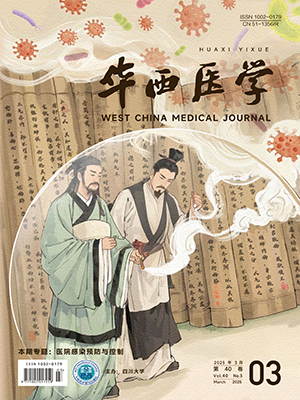| 1. |
Krejs GJ. Gastric cancer:epidemiology and risk factors[J]. Dig Dis, 2010, 28(4/5):600-603.
|
| 2. |
Yang D, Hendifar A, Lenz C, et al. Survival of metastatic gastric cancer:significance of age, sex and race/ethnicity[J]. J Gastrointest Oncol, 2011, 2(2):77-84.
|
| 3. |
Jiang Y, Montero AJ, Staveley-O'Carroll KF. Adjuvant and preoperative therapy for localized gastric cancer[J]. Gastrointest Cancer Res, 2007, 1(4):139-145.
|
| 4. |
彭淑牖.晚期胃癌不要轻易放弃手术切除的机会[J].中国实用外科杂志, 2001, 21(7):400-401.
|
| 5. |
Koizumi W, Narahara H, Hara T, et al. S-1 plus cisplatin versus S-1 alone for first-line treatment of advanced gastric cancer (SPIRITS trial):a phaseⅢtrial[J]. Lancet Oncol, 2008, 9(3):215-221.
|
| 6. |
Miller AB, Hoogstraten B, Staquet M, et al. Reporting results of cancer treatment[J]. Cancer, 1981, 47(1):207-214.
|
| 7. |
金晟娴.肿瘤化疗药物新的不良反应评价系统-CTCAE v3.0[J].儿科药学杂志, 2011, 17(3):53-55.
|
| 8. |
周际昌.实用肿瘤内科学[M].北京:人民卫生出版社, 1998:47-48.
|
| 9. |
韩宇.内镜下介入治疗进展期胃癌的疗效观察[J].中国肿瘤临床与康复, 2007, 14(3):263.
|
| 10. |
金巨光, 赵忠春, 徐克, 等.进行期胃癌术前经动脉化疗栓塞的临床及病理学研究[J].临床医学影像杂志, 1996(2):86-88.
|
| 11. |
路平, 王舒宝, 袁媛, 等.胃癌术前动脉栓塞化疗的临床及病理学研究[J].中华医学杂志, 1996(2):67-68.
|
| 12. |
刘福坤, 李国立, 陈忠豪, 等.胃癌术前介入治疗的临床和病理观察(附250例报告)[J].南京大学学报:自然科学版, 1998, 34(2):45-49.
|
| 13. |
刘福坤, 陈忠豪, 李国立, 等.胃癌术前介入治疗后血管变化与癌组织坏死的关系[J].华人消化杂志, 1998, 6(8):686-688.
|
| 14. |
帅磊渊, 王子卫.介入化疗在进展期胃癌新辅助化疗中的应用现状[J].医学综述, 2007, 13(13):993-996.
|
| 15. |
潘彦康.胃癌介入化疗与全身化疗的疗效比较[J].吉林医学, 2009, 30(15):1561-1562.
|
| 16. |
刘福坤.介入治疗在胃肠道肿瘤中的应用[J].腹部外科, 2004, 17(5):267-269.
|
| 17. |
吴鹏, 朱正纲, 叶正宝, 等. 5-氟尿嘧啶-2'-脱氧核苷经胃左动脉介入灌注后的药代动力学实验研究[J].外科理论与实践, 2004, 9(2):135-139.
|
| 18. |
詹文华.胃癌联合脏器切除术的合理选择及应用——胰十二指肠切除术在进展期胃癌中的应用[J].中国实用外科杂志, 2001, 21(7):398-400.
|




